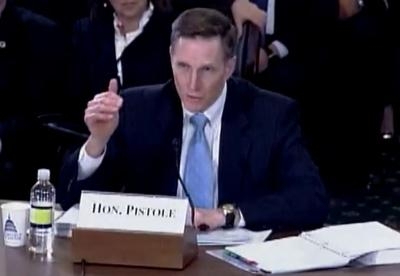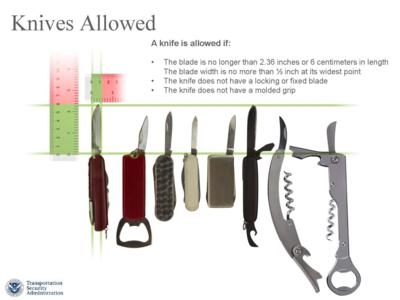Offers Testimony To The House Committee On Homeland Security
TSA Administrator John Pistole spent part of his Thursday on the hot seat in front of the U.S. House of Representatives Committee on Homeland Security Subcommittee on Transportation Security defending his recent decision to allow certain knives on board airplanes. "Given my recent decision to remove certain items from the prohibited items list beginning April 25th, the subject of this hearing is quite timely," Pistole said in his prepared remarks. "Given the recent concerns expressed by some regarding my decision to remove certain small pocket knives and some types of sporting equipment from the prohibited items list, I’d like to address this issue up front."

Pistole said that the decision was made after an evaluation of the latest intelligence and threat information from the U.S. Intelligence and Law Enforcement Communities about how terrorists' tactics have changed since 9/11. He said that they also considered how TSA's current policy aligned with international security standards, and how a change to permit an item would impact on security operations and the traveling public.
The process also included an evaluation of whether the change would increase the risk of a successful terrorist attack to bring down an aircraft, and consideration the potential increased risk to FAMS, passengers, or flight crew.
"While the ultimate goal of a terrorist may be a successful attack within the US against a US commercial aircraft, changes to aviation security since 2001 have resulted in attacks emanating from overseas aboard aircraft flying to the US," Pistole said. "Over the past several years, TSA has placed a great deal of emphasis not only on multiple layers of security here in the U.S. but on raising international aviation security standards and achieving harmony among the international community."
"With hardened cockpit doors, better identification of individual passengers against terrorist watch lists, other security changes, and the demonstrated willingness of passengers to intervene to assist flight crew during a security incident, it is the judgment of many security experts worldwide, which I agree with, a small pocket knife is simply not going to result in the catastrophic failure of an aircraft," Pistole told the Committee. "An improvised explosive device will. Over the past decade, TSA has identified and prevented more than 3.5 million small knives of the type I decided to allow. And we know from internal convert testing, searching for these items, which will not blow up an aircraft, can distract our security officers from focusing on the components of an explosive device."

Pistole said he understands the concerns expressed by many in the industry, but said similar arguments were made in 2005 when a previous TSA Administrator changed the prohibited items list to allow small scissors less than 4 inches in length and screw drivers less than 7 inches in length. "Contrary to claims that we would see a rash of assaults on flight attendants and passengers using these items – that simply has not been the case," he said.
Pistole said that there are many other changes TSA is making to strengthen our capabilities to keep terrorists off commercial aircraft. "Many of these changes reflect risk-based security initiatives I began implementing 18 months ago in an effort to shift away from the one-size-fits-all approach to passenger screening adopted in the wake of the 9/11 attacks. Similar to my decision to change the prohibited items list, these initiatives reflect analysis of the best available intelligence and sound risk-management principles."
(Top image from House Homeland Security Committee YouTube video. Bottom image provided by TSA)
 ANN's Daily Aero-Linx (06.29.25)
ANN's Daily Aero-Linx (06.29.25) ANN's Daily Aero-Term (06.29.25): Gross Navigation Error (GNE)
ANN's Daily Aero-Term (06.29.25): Gross Navigation Error (GNE) Classic Aero-TV: Anticipating Futurespace - Blue Origin Visits Airventure 2017
Classic Aero-TV: Anticipating Futurespace - Blue Origin Visits Airventure 2017 NTSB Final Report: Cirrus SR22
NTSB Final Report: Cirrus SR22 Airborne Affordable Flyers 06.26.25: PA18 Upgrades, Delta Force, Rhinebeck
Airborne Affordable Flyers 06.26.25: PA18 Upgrades, Delta Force, Rhinebeck




